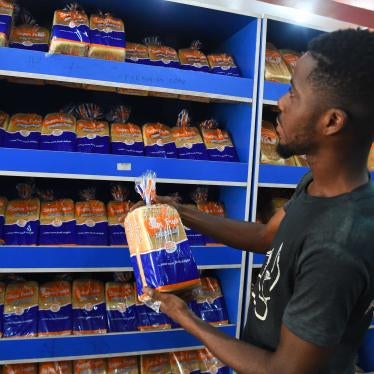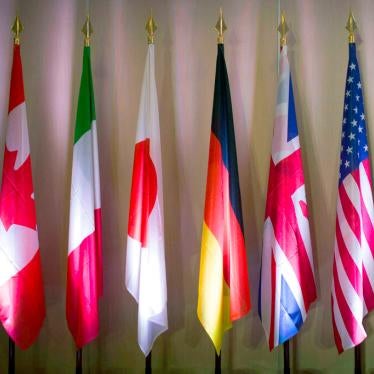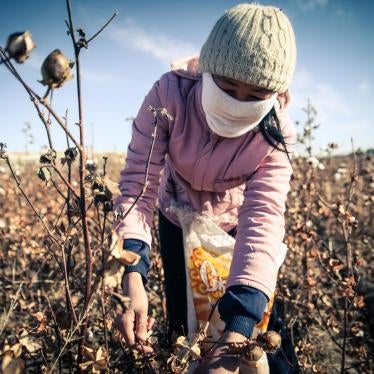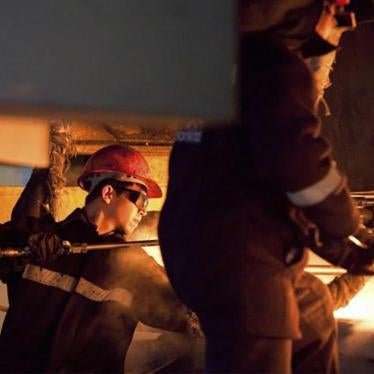The Uzbek government has effectively blocked the Erk Democratic Party from holding its congress in Tashkent and has increased persecution of the opposition party’s members, Human Rights Watch said today.
Government authorities failed to respond to the party’s September 4 request to hold its national meeting on September 27. Atanazar Arifov, the General Secretary of Erk, told Human Rights Watch that without government permission, no venue manager was willing to rent premises to Erk for the meeting, at which more than 400 participants were expected.
“Uzbek officials use the rhetoric of rule of law and democracy,” said Rachel Denber, deputy director of Human Rights Watch’s Europe and Central Asia Division. “Yet they refuse to allow an opposition political party to hold a simple meeting.”
In its March 2003 country strategy for Uzbekistan, the European Bank for Reconstruction and Development (EBRD) called on the Uzbek government to allow for “greater political openness” as one of three political benchmarks on which the bank conditioned its long-term engagement in Uzbekistan. The EBRD held its controversial 2003 annual meeting in Tashkent in May.
“Preventing a political gathering flies in the face of the EBRD benchmarks,” said Denber. “The EBRD and shareholder countries should protest the Uzbek government’s actions and urge it to register opposition political parties.”
In the lead-up to the Erk congress, officials harassed and threatened Erk members in a clear attempt to dissuade them from attending the congress.
In one case, an Erk member in Tashkent was badly beaten. On August 18, two masked men broke into the home of Tashpulat Yuldashev, an Erk member responsible for writing the party’s platform. They beat Yuldashev, causing a concussion and bruising, including a black eye. Yuldashev told Human Rights Watch that since then he and others closely associated with him have been summoned for police questioning about his political activities on several occasions and that he has been under constant surveillance.
In August, tax police in Bukhara launched an investigation into the business dealings of Nasrullo Saidov, the head of Erk in that city. Launched two weeks before Saidov was to hold a regional Erk conference, the timing of the investigation suggests it was intended to dissuade him from holding the meeting. The conference was cancelled as a result of the investigation and Saidov is now facing criminal charges that have sprung it.
Arifov told Human Rights Watch that the police have telephoned him on several occasions and warned him not to attend the regional Erk conferences that were held in the lead-up to the September congress in Tashkent. Another Erk member, also from Tashkent, told Human Rights Watch that his son was threatened with criminal charges as a warning to his father to stop his political activity.
In an earlier incident, police in Chirchik arrested Hasan Kambarov, another Erk member, on March 23, 2003 and held him incommunicado until May 14. According to Kambarov’s relatives, he was tortured in custody through methods that included electric shock and suffocation. Police questioned him about his political activities and asked him to name other Erk members. Police reportedly detained him again on May 22, but they and other authorities denied holding him. Kambarov’s relatives received no news of him until July 15, when a man told them that he had spent several days in a Chirchik police cell with Kambarov in July and that Kambarov appeared to have been beaten. However, the authorities continue to deny that he is in their custody.
“Brutal persecution of the political opposition is unfortunately routine here,” said Denber. “Although the government claims to be responding to calls to reduce torture and increase democratic participation, perceived opposition to the government is often met with violence.”
The Erk (Freedom) Democratic Party is a political opposition group now effectively banned in Uzbekistan. In the 1991 presidential elections its leader, Mohammed Solih, who is now in exile in Norway, was the only independent candidate ever to challenge Uzbek President Islam Karimov. In November 2000, the Supreme Court of Uzbekistan sentenced Solih in absentia to a 15-year prison term on charges of terrorism and anti-state activities. Human Rights Watch monitored the trial, and found it reminiscent in all respects of Soviet-era show trials. No material evidence of Solih’s guilt was presented. Nine of Solih’s co-defendants also received lengthy terms in prison, and two other men, sentenced in absentia in the same trial, were sentenced to death. Other individuals associated with Erk remain in prison and should be released, Human Rights Watch said. These include Muhammad Bekjanov, Rashid Bekjanov (both brothers of Mohammed Solih), Kobil Dierov, Mamadali Mahmudov, Ne'mat Sharipov, and Iusuf Ruzimuradov.







